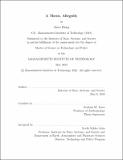A Thesis, Allegedly
Author(s)
Hong, Jisoo
DownloadThesis PDF (4.708Mb)
Advisor
Jones, Graham M.
Terms of use
Metadata
Show full item recordAbstract
Current approaches for studying the spread of misinformation on social media tend to focus on the factual integrity of shared content and the reach or circulation of false claims. However, a focus on the truth value of content can obscure the embeddedness of information in social, communicative practices. One way of apprehending the sociocultural dimensions is through an analysis of the stances people take toward the information they circulate online.
In this thesis, we investigate how language mediates perceptions of truth and reality through a close examination of how data is animated as evidence. This process, we argue, is fundamentally interactional and dialogic. Using sociolinguistic and natural language processing (NLP) techniques, we demonstrate how specific features of evidential talk, such as the use of epistemic adverbs like allegedly or supposedly, can dramatically alter how evidence is taken up in discussions of scientific controversy. We present the hearsay effect, a numerical measure mapping the entextualization of data as hearsay to its engagement and circulation on social media, to characterize how subtle inflections in epistemic modulation shape the social life of evidence. We find that the hearsay effect is variably salient in different discursive communities, and is particularly prominent in our case study of evidential discourse amongst ufologists on Twitter. We suggest that this analysis of the strength of weak evidence within contested sites of knowledge production offers new ways of conceptualizing how information and misinformation is animated in the online public sphere.
Date issued
2022-05Department
Massachusetts Institute of Technology. Institute for Data, Systems, and SocietyPublisher
Massachusetts Institute of Technology